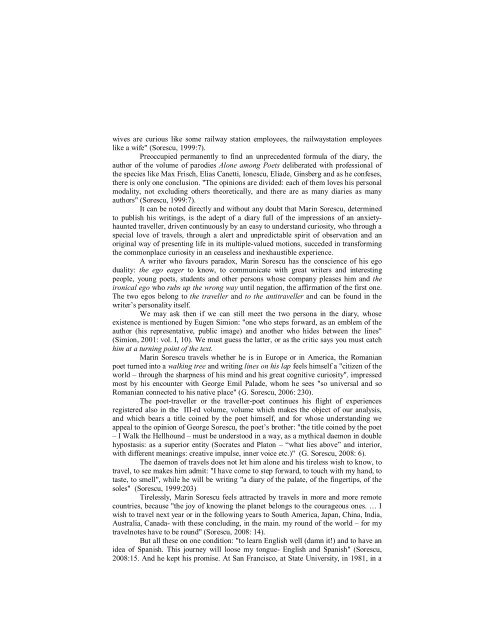language and literature european landmarks of identity
language and literature european landmarks of identity
language and literature european landmarks of identity
Create successful ePaper yourself
Turn your PDF publications into a flip-book with our unique Google optimized e-Paper software.
wives are curious like some railway station employees, the railwaystation employees<br />
like a wife" (Sorescu, 1999:7).<br />
Preoccupied permanently to find an unprecedented formula <strong>of</strong> the diary, the<br />
author <strong>of</strong> the volume <strong>of</strong> parodies Alone among Poets deliberated with pr<strong>of</strong>essional <strong>of</strong><br />
the species like Max Frisch, Elias Canetti, Ionescu, Eliade, Ginsberg <strong>and</strong> as he confeses,<br />
there is only one conclusion. "The opinions are divided: each <strong>of</strong> them loves his personal<br />
modality, not excluding others theoretically, <strong>and</strong> there are as many diaries as many<br />
authors" (Sorescu, 1999:7).<br />
It can be noted directly <strong>and</strong> without any doubt that Marin Sorescu, determined<br />
to publish his writings, is the adept <strong>of</strong> a diary full <strong>of</strong> the impressions <strong>of</strong> an anxietyhaunted<br />
traveller, driven continuously by an easy to underst<strong>and</strong> curiosity, who through a<br />
special love <strong>of</strong> travels, through a alert <strong>and</strong> unpredictable spirit <strong>of</strong> observation <strong>and</strong> an<br />
original way <strong>of</strong> presenting life in its multiple-valued motions, succeded in transforming<br />
the commonplace curiosity in an ceaseless <strong>and</strong> inexhaustible experience.<br />
A writer who favours paradox, Marin Sorescu has the conscience <strong>of</strong> his ego<br />
duality: the ego eager to know, to communicate with great writers <strong>and</strong> interesting<br />
people, young poets, students <strong>and</strong> other persons whose company pleases him <strong>and</strong> the<br />
ironical ego who rubs up the wrong way until negation, the affirmation <strong>of</strong> the first one.<br />
The two egos belong to the traveller <strong>and</strong> to the antitraveller <strong>and</strong> can be found in the<br />
writer’s personality itself.<br />
We may ask then if we can still meet the two persona in the diary, whose<br />
existence is mentioned by Eugen Simion: "one who steps forward, as an emblem <strong>of</strong> the<br />
author (his representative, public image) <strong>and</strong> another who hides between the lines"<br />
(Simion, 2001: vol. I, 10). We must guess the latter, or as the critic says you must catch<br />
him at a turning point <strong>of</strong> the text.<br />
Marin Sorescu travels whether he is in Europe or in America, the Romanian<br />
poet turned into a walking tree <strong>and</strong> writing lines on his lap feels himself a "citizen <strong>of</strong> the<br />
world – through the sharpness <strong>of</strong> his mind <strong>and</strong> his great cognitive curiosity", impressed<br />
most by his encounter with George Emil Palade, whom he sees "so universal <strong>and</strong> so<br />
Romanian connected to his native place" (G. Sorescu, 2006: 230).<br />
The poet-traveller or the traveller-poet continues his flight <strong>of</strong> experiences<br />
registered also in the III-rd volume, volume which makes the object <strong>of</strong> our analysis,<br />
<strong>and</strong> which bears a title coined by the poet himself, <strong>and</strong> for whose underst<strong>and</strong>ing we<br />
appeal to the opinion <strong>of</strong> George Sorescu, the poet’s brother: "the title coined by the poet<br />
– I Walk the Hellhound – must be understood in a way, as a mythical daemon in double<br />
hypostasis: as a superior entity (Socrates <strong>and</strong> Platon – “what lies above” <strong>and</strong> interior,<br />
with different meanings: creative impulse, inner voice etc.)" (G. Sorescu, 2008: 6).<br />
The daemon <strong>of</strong> travels does not let him alone <strong>and</strong> his tireless wish to know, to<br />
travel, to see makes him admit: "I have come to step forward, to touch with my h<strong>and</strong>, to<br />
taste, to smell", while he will be writing "a diary <strong>of</strong> the palate, <strong>of</strong> the fingertips, <strong>of</strong> the<br />
soles" (Sorescu, 1999:203)<br />
Tirelessly, Marin Sorescu feels attracted by travels in more <strong>and</strong> more remote<br />
countries, because "the joy <strong>of</strong> knowing the planet belongs to the courageous ones. … I<br />
wish to travel next year or in the following years to South America, Japan, China, India,<br />
Australia, Canada- with these concluding, in the main. my round <strong>of</strong> the world – for my<br />
travelnotes have to be round" (Sorescu, 2008: 14).<br />
But all these on one condition: "to learn English well (damn it!) <strong>and</strong> to have an<br />
idea <strong>of</strong> Spanish. This journey will loose my tongue- English <strong>and</strong> Spanish" (Sorescu,<br />
2008:15. And he kept his promise. At San Francisco, at State University, in 1981, in a


